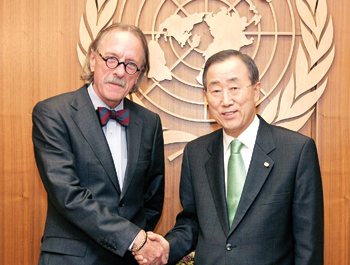Library of Parliament Research Publications
Occasional and Commissioned Papers
Selected Key Themes Addressed in IPU Assemblies
The IPU and the United Nations
After much work the IPU was … given a form of recognition as the parliamentary parallel organization of the UN. The problem is that simultaneously there was and still is a group of people who thought that the IPU was a complete waste of time and what the United Nations needed was a much more closely affiliated group of parliamentarians and so the IPU spent a lot of time working to reaffirm its own status. — Senator Joan Fraser, 2012
The IPU is the parliamentary parallel organization of the UN and has had a cooperation agreement with the UN since 1996. In 2002, the UN General Assembly granted permanent observer status to the IPU, along with the right to circulate its official documents. This status, which brings a parliamentary dimension to the UN’s work, was achieved through some 30 years of efforts by the IPU – efforts that were strongly supported by the Canadian Group.
The Cooperation Agreement
Recognition of the IPU by the UN was first proposed by a British delegate in 1946 (Copenhagen). The matter was referred to a sub-committee, which decided to request consultative status with the UN’s Economic and Social Council; this was granted in 1947.
In 1982 (Rome), Gérald Laniel, MP, presented an amendment submitted by Canada that “[called] on Parliaments and the Inter-Parliamentary Union to search for appropriate means of strengthening the participation of parliamentarians in the work of the United Nations.”
This seems to be a legitimate objective for the Union in view of its representative nature. Parliamentarians should also be associated with both the Regular Sessions and Special Sessions of the United Nations so as to increase the influence of national parliaments over the activities of this organization. — Gérald Laniel, MP, 1982
In 1983 (Seoul), Senator Peter Bosa was rapporteur for a committee that dealt with a resolution on ways to strengthen the UN. The concern was raised that the IPU’s consultative status with the UN had proved inadequate. The resolution adopted in the final plenary, without a vote, called on the UN to grant “appropriate status” to the Union.
In 1992 (Stockholm), Edna Anderson, MP, was rapporteur of a drafting committee that dealt with the relationship between the IPU and the UN. The drafting committee used the Canadian text submitted on this topic as the basis of a resolution – adopted unanimously in the final plenary – that called on the IPU to seek observer status with the UN General Assembly.

Anders B. Johnsson, IPU Secretary General, meets Ban Ki-moon, UN Secretary General, in 2009 (New York) © United Nations / Photographer: Jenny Rockett
In 1995 (Madrid), the IPU adopted a resolution calling once again for stronger cooperation between the IPU and the UN. National groups were urged to approach their foreign affairs ministers to seek support for this initiative. Upon returning to Canada, the Chair of the Canadian Group wrote to the Hon. André Ouellet, then Minister of Foreign Affairs, and received his support.
The Inter-Parliamentary Union has been an excellent advocate for the United Nations. Canada was very pleased to co-sponsor the resolution on cooperation between the UN and the IPU, and we expect to join the consensus when the item is placed before the General Assembly. — André Ouellet, Minister of Foreign Affairs, 1995
In 1996, the IPU and the UN signed a cooperation agreement. Subsequently, the IPU established formal cooperative arrangements with several UN bodies, such as UNESCO, the Office of the UN High Commissioner for Human Rights and the United Nations Development Programme.
In 2000 (in both Amman and Jakarta), several delegations – including Canada – again expressed concern that the IPU did not have speaking rights at the UN General Assembly, and pressed for further action on this issue. In 2002 (Marrakech), Senator Joan Fraser briefed the Twelve Plus Group on the IPU Executive Committee’s work to reintroduce a draft resolution requesting observer status with the UN General Assembly. She encouraged delegates to lobby their respective governments and UN ambassadors. The President of the Canadian Group, Paddy Torsney, MP, wrote to the Hon. Bill Graham, then Minister of Foreign Affairs, to request the Canadian government’s support for the draft resolution. The UN General Assembly granted the IPU permanent observer status in 2002.
The IPU’s celebration of the 40th anniversary of the United Nations during the 74th Assembly in Ottawa in 1985 was a unique occasion, being the first time an IPU session had been interrupted to celebrate a special event.
Permanent Observer Status
Since 2002, cooperation has strengthened between the two organizations. Of particular interest is the IPU-UN Parliamentary Hearing held annually at the UN headquarters, which strives to enhance the role of parliamentarians in global governance. Members of the Canadian Group have been active participants in these hearings and have served as panellists on several occasions. Canadian delegates have also participated regularly and actively since 2005 in sessions of the UN Commission on the Status of Women.
In 2007 (Nusa Dua, Bali), the IPU established a Committee on United Nations Affairs to review and report regularly on progress in IPU-UN cooperation. The Committee has set up an Advisory Group to support its work; Senator Dennis Dawson was elected as one of its members in 2012.
During the 2010 IPU-UN Parliamentary Hearing, Canadian delegates worked with legislators from 11 other parliaments to draft a resolution seeking a closer relationship between the two organizations on both the political and operational levels. The resolution, which called on the UN to put this item on the agenda of its General Assembly, was adopted by the UN General Assembly in May 2012. It sets a course for greater engagement between the UN, the IPU and its members in the areas of peace, democracy, human rights and development.
© Library of Parliament 2012

